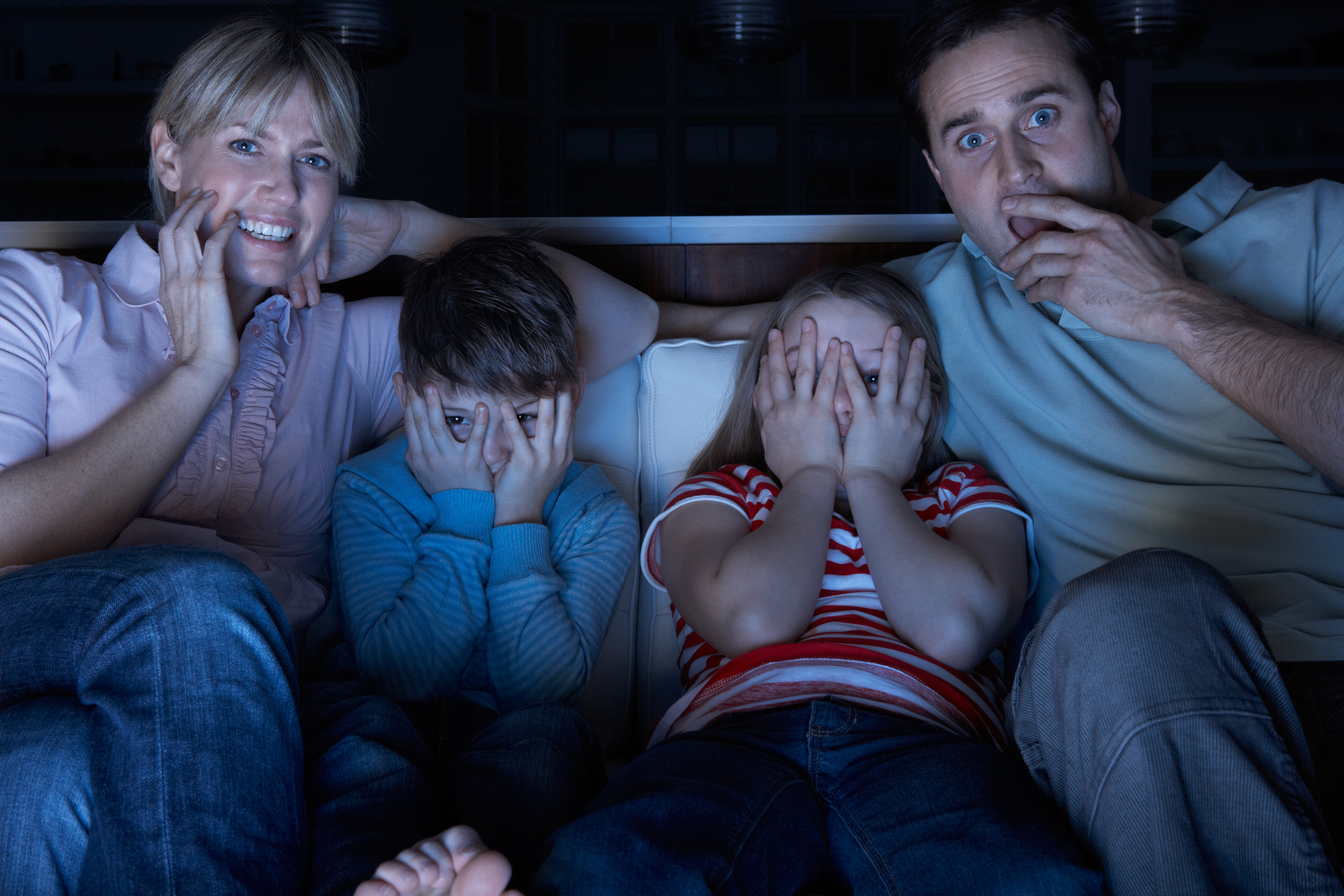 If you are a parent, your child has probably pressed you on gaining access to things on the screen that “push the limits.” With three boys (ages 8, 12, and 16), my wife and I have been in the thick of this for quite some time! Our kids often want access to scary movies, but should we let them? Could they be harmful?
If you are a parent, your child has probably pressed you on gaining access to things on the screen that “push the limits.” With three boys (ages 8, 12, and 16), my wife and I have been in the thick of this for quite some time! Our kids often want access to scary movies, but should we let them? Could they be harmful?
Although I’ve written a book about tech/life balance, this is still a struggle. But, hey, if there were easy answers to any of this, you wouldn’t be reading this blog… and I wouldn’t be writing it.
Those Tough Questions That Or Kids Ask
Here’s a sample of some of the questions my kids have asked me and my wife over the years. I’m sure you can relate:
- I’m tired of watching Mickey Mouse Clubhouse. Can I watch Tom & Jerry now? No?! Why not? When can I?
- Can I get a smartphone? No?! Why not? When can I?
- Can I play Five Nights at Freddy’s? Hungry Shark? Mortal Kombat 11? Uncharted 4? Skyrim? Grand Theft Auto 5? Fall Out 4? Red Dead Redemption? No?! Why not? When can I?
- Can I watch The Simpsons? Family Guy? South Park? Stranger Things? The Terminator? Game of Thrones? Deadpool? Alien? The Matrix? The Shining? It? No?! Why not? When can I?
Our Kids Try to Trap Us
You will recognize some of these ploys that our kids use in an attempt to convince us that we should indeed let them watch such scary movies/shows or play those scary/violent games:
- That’s not fair! You let my (older) brother watch it! Why can’t I?
- All of my friends have seen that movie (or played that game). Why won’t you let me?
- You watched that movie as a kid when you were younger than me! Why won’t you let me watch it?
- You already let me (play that other game/watch that other show), and it was just as violent/scary. Why won’t you let me watch/play this one? (Sidebar: This one drives me nuts!)
Are Scary Movies and Shows Harmful to Kids?
I try to stay up to speed on the latest research findings on the effects of screens on kids/teens. Even within the research, there is still debate on these issues. There are many variables involved when it comes to the effects of screens, so it’s complicated! My short answer to this question is that scary movies/shows are not truly harmful to kids, but read on for the longer answer plus some tips.
I blogged about this, but we can reflect on our own screen experiences as kids/teens in which we “pushed the limits” (or blew past them) to inform our parenting. Were we harmed in any substantial, lasting way by the types (and amounts) of screen time we had as kids? Probably not.
Well, I did become a psychologist. Maybe all those monster movies and slasher films I saw as a kid played a part? Physician, heal thyself!
Still, as parents, we want our kids to be happy and healthy. Because we share this goal, we naturally have concerns about the effects of scary movies/shows (and video games!) on our kids. This is especially true given how rapidly technologies have evolved. Our kids can access content and play video games that we couldn’t even dream of when we were young.
First, regarding the effects of these scary movies and video games, let’s agree that we are NOT talking about the most extreme scenarios. That is, we are not talking about 4-year-olds watching slasher movies for 12 hours per day or playing M-rated survival/horror games on VR headsets for hours on end. We are talking about more typical viewing and gaming experiences that are within the broad range of “normal.”
Thoughts and Tips About Those Scary Movies (and Games)
- When we are talking about the effects of scary movies/shows on kids, we must distinguish between short-term, transient harms (such as temporary fears) vs. long-term harms (such as the development of Generalized Anxiety Disorder). Let’s distinguish them by calling the short-term or small harms “harm” and the long-term, significant harms “Harm.”
- Even when researchers find negative effects of screens on kids/teens, typically, the effects are very small. In other words, playing Fortnite or watching Stranger Things is not going to turn a happy, polite child into a psychopath or an emotionally disturbed individual. Sometimes researchers find screen “harm,” but rarely do they ever find screen “Harm.”
- Thus, our level of concern about the effects of screens on kids should match their potential for harm. Since the threat of Harm is quite small for typical screen experiences overall, we shouldn’t be panicking. The sky is not falling. We don’t want to parent in a state of fear when it is not warranted.
- The most realistic negative outcome for a kid being exposed to content that is too scary for him/her is some transient fears such as increased fear of the dark and strangers, trouble sleeping, and some nightmares. So, your child might experience some “harm,” but it’s unlikely he/she will experience “Harm.”
- We must remember that the point of watching scary movies and playing scary video games is to, well, be scared. So, some of that fear is experienced as a type of enjoyment. It’s the same reason why we like to ride rollercoasters or go to haunted houses. It’s an adrenaline rush!
- We must weigh the enjoyment that our kids get from their screens against any harms. It’s probable that they experience both. That is, they might really enjoy watching Stranger Things, but have some disturbing images flash in their heads that keep them up a little bit at night. Does their enjoyment outweigh this type of harm?
- Talk to other parents. Find out what your child’s friends are really watching/playing. While we don’t necessarily want to use their standards, there is a type of “harm” from our kids being/feeling left out.
- Related to the above, try not to be on the front end of the curve with regard to what your child experiences on the screen. I don’t want my child to be the first in his grade to watch It, for instance.
- There is a difference between harm to our values as parents and psychological/behavioral harm. That is, we might not want our young child to play certain violent video games or watch certain violent/scary movies, because those don’t align with our values as parents. For example, we might not like how violence is glorified, or women are objectified. This doesn’t necessarily mean that the content would cause harm (or Harm) to our kids in the forms of recurrent nightmares or increased aggression. Still, harm to one’s values is still a type of harm.
- If you have a partner, talk to him or her to try to get on the same page. It’s easier if you have a “united front” instead of a “house divided.”
- If your child has an older sibling, ask him or her what they think when your younger child is not around. “James, your little brother wants to watch Stranger Things. What do you think?”
- As a rough guideline, use the MPAA and ESRB reviews. You can also research the specific content of the movies, shows, and games to help inform your decision-making. As you know, movies/games with the same rating can be vastly different. The Breakfast Club and The Matrix are both rated “R,” and these are much milder than the R-rated films Deadpool, Logan, and The Shining.
- Talk to your child about your values, concerns, and why you set limits. Acknowledge his/her feelings: “Aden, I know you really want to watch Stranger Things. I’m concerned that it is still a bit too intense for your age. Part of my job as a parent is to protect you from things that might cause harm. While you might like Stranger Things, I’m still concerned that the intense scenes might be too scary and disturbing for your age.” This doesn’t mean that your child will agree with you or back down, but it’s better than just saying, “because I said so.”
- It doesn’t have to be all or none. For instance, if it is a movie/show with which you are familiar, you could strategically cover your child’s eyes at certain parts or skip particular scenes. Haven’t we all done a version of this when we cover our eyes during some parts of scary films?
- We do know that, as our kids get older, we have to back off. I can tell you what will cause Harm—restricting a 17-year-old to watching only shows like Mickey Mouse Clubhouse! So, as your child gets older, gradually pull back on restrictions. Talk to them about the content ahead of time. Help them understand the difference between what they see on the screen and what happens or is acceptable in reality.
- If it is a show or movie, watch it with them. If it is a video game, observe gameplay. Talk to them about it.
- Observe how your child reacts to the show/movie. Notice whether they cover their eyes a lot during the show. Ask them how scary they found it. Do they need to sleep with a light on or in your bedroom? You might have your answer as to whether it was too intense right there!
- Know that every child is different. Some kids get spooked very easily while another child at the same age isn’t bothered at all by the same show.
- Help your child reflect upon their screen experiences so that they can better understand what they like and don’t like. Let them know it’s perfectly OK not to like scary shows/movies too. Some kids find this out after testing the waters. Perhaps they only like scary movies with aliens, but don’t like more realistic horror films.
The Takeaway?
Being a parent is often difficult. Our kids often want to push boundaries and limits with regard to our comfort zones. But that is part of what kids are supposed to do developmentally! When it comes to parenting, to quote Voltaire, “The Perfect is the Enemy of the Good.” Just aim for “good enough” parenting.
When it comes to the effects of scary movies and games on our kids, we should not be in a state of fear over them. Even if we allow our kids to watch/play something that’s too scary or intense, we are talking mild, transient harm, not major Harm. Trust your parenting and strive for “good enough!”

